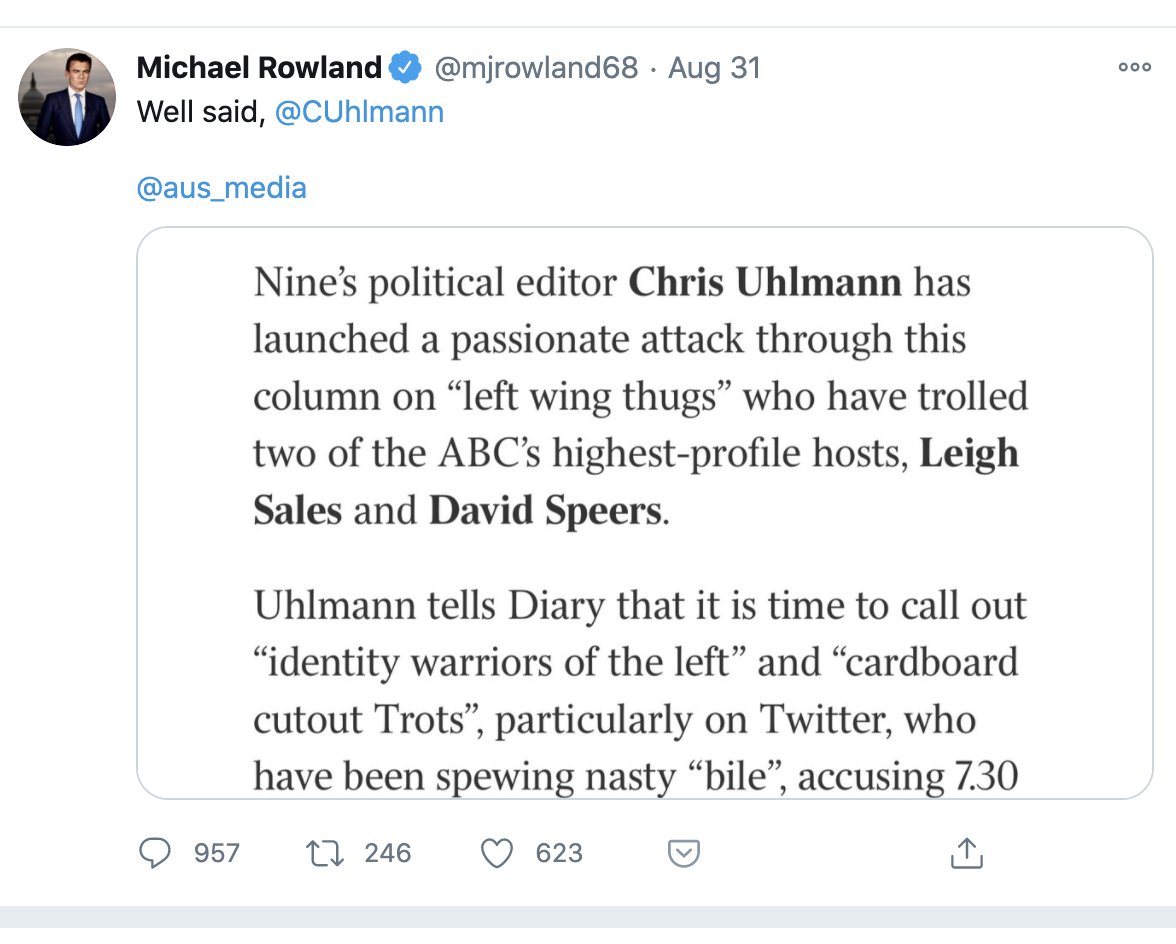This is a great piece by Oz & he really has done some important work highlighting failures of the Andrews& #39; Govt.
I& #39;m going to add a & #39;but& #39; bc there is a further point to be made, and it is something I have been saying for 20 years about the relationship between media & audience. https://twitter.com/oz_f/status/1320462678175854592">https://twitter.com/oz_f/stat...
I& #39;m going to add a & #39;but& #39; bc there is a further point to be made, and it is something I have been saying for 20 years about the relationship between media & audience. https://twitter.com/oz_f/status/1320462678175854592">https://twitter.com/oz_f/stat...
To say, & #39;When the public side with the powerful over journalists, we all lose& #39; is to miss a fundamental point. Namely that, compared to the media, most people feel incredibly powerless.
Relative to most of the population, journalists ARE powerful.
Relative to most of the population, journalists ARE powerful.
So in challenging the Murdoch Media––and that is where most of the criticism of media is directed––the public are not siding with power over journalists. They are, in fact, challenging one of the most powerful institutions in the country.
Does this sometimes turn into the Dan stanning Oz is complaining about? For sure. Does it mean that even good journalists occasionally cop a spray they don& #39;t deserve? It does, unfortunately.
Is this the same as the public siding with the powerful over journalists?
Absolutely not.
Is this the same as the public siding with the powerful over journalists?
Absolutely not.
It is people who feel incredibly disempowered and marginalised, hitting back against an institution they see as, not all the time, but far too often, misrepresenting and misreporting on something that people themselves are living through and trying to deal with as best they can.
This power imbalance is fundamental to the relationship between media and audience.
We can& #39;t pretend it is a level playing field.
The fact that Oz gets to right an article in The Age and someone like me can only respond on Twitter, is indicative of that imbalance.
We can& #39;t pretend it is a level playing field.
The fact that Oz gets to right an article in The Age and someone like me can only respond on Twitter, is indicative of that imbalance.
Over the last few months, how many articles have appeared by senior and not-so-senior journalists denigrating people on Twitter?
How often have they genuinely sought to engage with any of the people they have attacked?
How often have they genuinely sought to engage with any of the people they have attacked?
How do journalists think this constant attack on their audience makes that audience feel?
Valued?
That their views are being heard & heeded?
More inclined to respect the institution?
Hardly.
It just feels like the powerful dumping on the powerless.
Because it is.
Valued?
That their views are being heard & heeded?
More inclined to respect the institution?
Hardly.
It just feels like the powerful dumping on the powerless.
Because it is.
How many articles have been published from an audience point of view?
Time after time, the likes of Chris Uhlmann and Phil Coorey, with high-fives from Michael Rowland or Leigh Sales et al, write what amount to hit pieces about & #39;Twitter& #39; as if nothing of value was ever expressed there and everyone here is the same.
So the articles appear, people hit back, sometimes unfairly, but then the next article is published anyway, the legitimate and careful criticism is ignored, everything is reduced to the shortcomings of the "Twitterarti", and round we go.
This is the definition of powerlessness.
This is the definition of powerlessness.

 Read on Twitter
Read on Twitter



